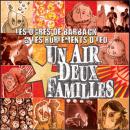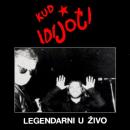Dom nam čuvaj Božja Mati,
i sinova naših cvijet.
Tvojom molbom nek se vrati
božji mir na cijeli svijet
(a)
Majko draga, Majko sveta,
slušaj svoje djece glas!
Bojni vihor svuda vlada
uništiti hoće nas.
(b)
Majko draga, Majko sveta,
slušaj svoje djece glas!
Bojni vihor, mržnja kleta
uništiti hoće nas.
Dragi naši redom ginu
na bojnim poljanama.
Majka, daj po svome Sinu
lijeka našim ranama.
Grad za gradom ljuto strada,
mirna sela mori strah,
smrt i pustoš svuda vlada
plačuć padamo u strah.
i sinova naših cvijet.
Tvojom molbom nek se vrati
božji mir na cijeli svijet
(a)
Majko draga, Majko sveta,
slušaj svoje djece glas!
Bojni vihor svuda vlada
uništiti hoće nas.
(b)
Majko draga, Majko sveta,
slušaj svoje djece glas!
Bojni vihor, mržnja kleta
uništiti hoće nas.
Dragi naši redom ginu
na bojnim poljanama.
Majka, daj po svome Sinu
lijeka našim ranama.
Grad za gradom ljuto strada,
mirna sela mori strah,
smrt i pustoš svuda vlada
plačuć padamo u strah.
Langue: anglais
English version by Jerko Bezić
Versione inglese di Jerko Bezić
Versione inglese di Jerko Bezić
SWEET MOTHER, DEAR MOTHER
Guard our home, Mother of God,
and the bloom of our sons.
Through your prayer may peace
Return in the whole world.
(a)
Sweet Mother, Holy Mother,
Heed the voice of your children!
The winds of war blow everywhere
they will soon destroy us.
(b)
Sweet Mother, Holy Mother,
Heed the voice of your children!
The winds of war, damned hatred,
they will soon destroy us
Dear ones falling in succession
On the killing fields of war
Mother, give us through your Son
Balsam for our aching wounds.
Devastation in the cities
Peaceful hamlets gripped in fear,
Death and wasteland on all sides now,
Weeping we collapse in fear.
Guard our home, Mother of God,
and the bloom of our sons.
Through your prayer may peace
Return in the whole world.
(a)
Sweet Mother, Holy Mother,
Heed the voice of your children!
The winds of war blow everywhere
they will soon destroy us.
(b)
Sweet Mother, Holy Mother,
Heed the voice of your children!
The winds of war, damned hatred,
they will soon destroy us
Dear ones falling in succession
On the killing fields of war
Mother, give us through your Son
Balsam for our aching wounds.
Devastation in the cities
Peaceful hamlets gripped in fear,
Death and wasteland on all sides now,
Weeping we collapse in fear.
×
![]()






The direct way in which the text of this song reflects the state of war in Croatia in the autumn and spring of 1991 calls for the presentation of all the verses of that text. [The second] verse is given in two versions, the first (a) as it was sung in Zagreb, and the second (b) as it was sung in Nova Kapela [a town near to the war zone around Nova Gradiška] - which is an indicator of the current nature, diffusion and vitality of the song.
(Jerko Bezić, Croatian traditional ecclesiastical an non-ecclesiastical religious songs sung during onerous times, in "Music, Politics and war: views from Croatia" edited by Svanibor Petta)
See also Ima jedna duga cesta
*
Nel 1991 cominciò l'intervento armato nella Repubblica Croata, da parte dell'Esercito Popolare Jugoslavo, che presto si trasformò in una vera e propria guerra aperta, con molte vittime e danni ingenti. In queste circostanze nacquero nuove canzoni. In Croazia, alcune vecchie canzoni religiose furono adattate alla situazione, in particolare quelle in cui si chiedeva protezione alla Madre di Dio dagli orrori della guerra.
Una di queste, Majko mila, Majko draga (Madre Dolce, Madre Cara) si distingue per la chiarezza del messaggio.
Il modo diretto con cui il testo della canzone riflette lo stato della guerra in Croazia nell'autunno e nella primavera del 1991, rende opportuno presentare tutte le strofe. La seconda strofa è presente in due versioni: la prima (a) era cantata a Zagabria, la seconda (b) era cantata a Nova Kapela, una città vicino alla zona di guerra intorno a Nova Gradiška. La presenza di due diverse versioni è un indice della diffusione e della vitalità della canzone.
(Jerko Bezić, vedi il brano originale inglese per i riferimenti. Traduzione di Lorenzo Masetti)
Vedi anche Ima jedna duga cesta